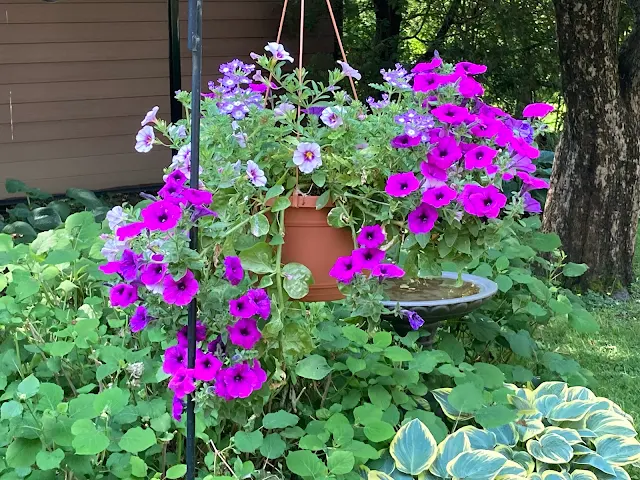An article on the BBC, "Is it better to Neglect Your Garden?”, suggests allowing "nature to take its own course". The whole article is of interest as it suggests the importance of biodiversity, which includes a variety of insects, weeds, and even urban wildlife, and the article goes in some depth on this subject. It even asks, "What if you just do nothing?", and just let one's manicured garden return to nature. This interests me but it would defeat the purpose of my garden; I need to cut the grass, using my push lawn mower, and cut grass allows easy access to the whole garden, especially for seniors, keeps the neighbours and one's family happy, and keeps the gardener busy and getting some exercise. I also need to do some weeding if I want to have as many perennial flowers as I have. To do nothing might reduce the diversity of flowers that I've planted over the years, which is part of a cottage garden; these plants have been cultivated for gardens that are maintained in a traditional way. A return to nature may end up being not having a garden at all; but raking and disposing of leaves in fall can also be limited and even eliminated. The author of the article writes,
While experts recommend doing a little less mowing and pruning in the spring and summer, it's also recommended to let some things pile up in the autumn, specifically leaves. The Xerces Society for Invertebrate Conservation, a non-profit organisation focused on the conservation of invertebrates, promotes an initiative called Leave the Leaves that advocates for this to protect insects that overwinter on your property.
I didn't discard the leaves last fall, I raked them onto flower beds, and, for the most part, they are no longer visible except around the hostas at the rear of the garden. They are excellent mulch and allowed my lavender, and other plants, to survive our particularly cold winter. My own approach to gardening is more aesthetic than anything, as it might be for most gardeners. I would like my own small, shady, garden to be as much a part of nature as possible. I welcome weeds, I welcome as many insects as visit the garden, I rejoice seeing birds, and I celebrate any wildlife that passes through the garden; a garden is a simulated return to nature that allows access for people to enter, sit and visit, or just walk through. An enclosed or walled garden is a private space for nature, usually in an urban setting, the more abandoned looking the better but not, in fact, abandoned at all. Gardening is more artifice than authenticity, as poets might say, although in poetry authenticity is better than artifice; living in the city some of us want to return to nature but just to neglect the garden ends up having an unusable and perhaps uninviting garden, and defeats the purpose of the cottage garden. Here are photographs of my garden taken on 10 June 2025; this is early June in Montreal's West End, still waiting for most perennials to bloom.






















